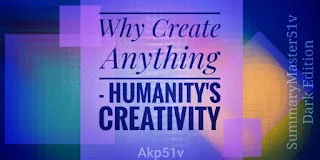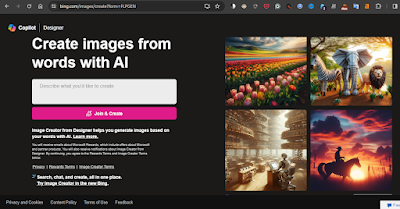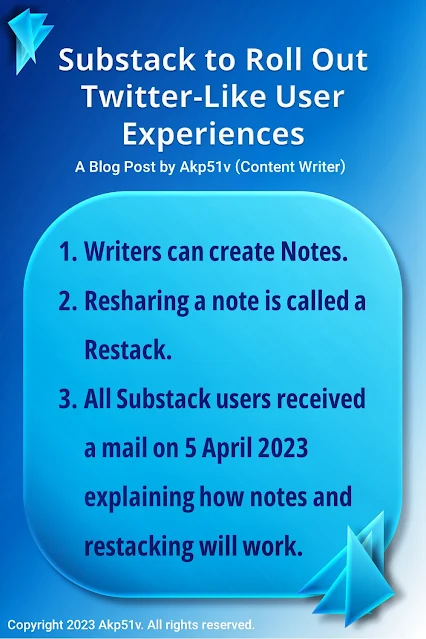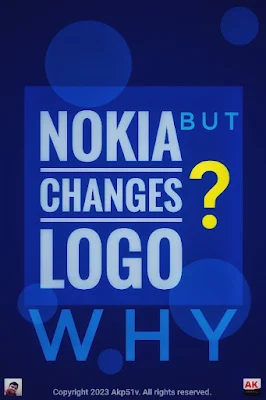Why Create Anything - Humanity's Creativity | Akp51v
 |
| Article Image: Abstract Illustration with blurred BG. |
Your mind has limitless imagination. And you can plan your schedule inside your head. Yes, this ability to convert your ideas into reality helps you in life. Solving problems and developing civilisation are key benefits of your creativity. So, we all embrace it.
Now, you might wonder why humanity is so creative. And the web is full of debates discussing this question.
When I completed college, I shared a conversation with one of my friends. And you can find it at the end of this article. For now, you can enjoy this humble exploration of this concept. Because your imagination can be a blessing, a burden or an unused asset.
Does every human have Creativity? Are humans naturally creative?
Let's say that you don't practice music. And your drawing books are not impressive. Or, journal writing makes you bored. Also, you might not experiment with your food recipes. Then, your choice of clothing could be subpar.
In fact, you might be the most boring and inactive person in the history of the world.
Still, you have creative potential. Believe it or not, but your creativity has affected your life choices. And it is okay to not showcase your interests in a visual manner. If you have solved a problem, you have it within you.
Do you dream? Can you predict a future outcome? Even your basic planning skills demand your judgement.
So, your imaginative powers might serve you differently. In short, you don't have to act in a drama, write poetry, play with pencils or learn a musical instrument. Why? Because you have been processing your ideas and unreal thoughts.
Are we all born creative? Yes, you are creative since your birth.
Why is Creativity a part of human nature? Is creativity a Human Need?
You will find a vast array of different answers to this question. Because using common logic, you might learn that human beings survive due to their ideas. If we consider the strengths of other organisms on Earth, you are correct to an extent.
Still, think about other life forms on our planet. How many species on Earth can compete with humans in creativity and imagination?
As you have guessed, being full of ideas and plans is not important for all beings. So, you would find the philosophical and biological investigations about this topic. And their results might confuse you more. Although our ideas help us improve the quality of our life, all theories remain complex.
But your brain indeed feels joy when you indulge in creative activities. The part is your brain that helps you enjoy delicious foods is also active during this process.
Of course, to lead a satisfying life, you need hobbies.
And your hobbies help you manage or modify your moods. As such, the answer to the second question is affirmative. Yes, you need creativity to maintain your brain health. It is a vital ability that helps you with stress management.
When did humans become creative? How did the early humans show their creativity?
If you watch the Indiana Jones films, you might recall that ancient civilisations existed many thousand years ago. Then, through archaeological studies and excavations, modern humans found relics. Their remnants of objects from the older eras are awaiting you in museums.
Once you apply the concepts of decaying, chemistry and anthropology, you get their age estimate.
And the ancient tools belong to the period of 40,000 to 60,000 thousand years ago. Or, we used to think so. Here, you might want to study this detailed article on ideatovalue.com. Innovation Consultant and Creativity Blogger Nick Skillicorn wrote it back in 2019. It cites a study by Heather Pringle from Scientific American.
Long story short, creativity might be present in humanity since 200,000 years ago.
Hence, you can see how much the answers vary. As the older jewellery and ancient tools become available, this estimation can go in any direction. Now, you know why these estimates are dynamic. But creative thinking is much older than our initial impression.
What are the roots of human creativity and imagination? How does your brain handle ideation?
For simple situations, you don't use your entire brain. When you tackle complex problems, your brain works as an agile agency of many project managers. Now, this is my personal creative analogy. And it works for me well enough.
But Alex Schlegel has explained it differently in a Live Science article by Tanya Lewis from 2013. Back then, Alex was a Cognitive Neurologist at Dartmouth College, Hanover, N.H. And Tanya was a staff writer at Live Science till 2015. Also, Alexander Schlegel has twenty neuroscientific articles as per Google Scholar [ as of 16 Sept. 2021 ].
So, the crux of the story was about brain imaging methods. That was how Alex's team arrived at their conclusions.
They asked the volunteers to imagine, combine and divide some simple shapes. While doing so, an MRI machine studied the volunteers. Then, the following four major parts of their brains had increased their activities.
- Occipital cortex.
- Posterior parietal cortex (PPC).
- The posterior precuneus.
- The dorsolateral prefrontal cortex (DLPFC).
In simple English, each volunteer's brain used its visual processing units. Here, nothing was new. But for modifying those shapes, even their Attention and Executive units cooperated.
Let me rephrase it this way. "Creating or imagining something new will use all parts of your brain. This is valid even if bodily physical labour is absent." Did I get it right? Well, moving on.
Is creativity unique to humans? Do animals have creativity?
Yes and no. At a conceptual level, many animals and birds are capable of creativity. Guess the artists of these ten paintings. That article is a BBC story by Jason G Goldman from 2014. Dr Jason is a science journalist and wildlife reporter. Also, he has been writing about conservation, biology and evolution for Scientific American since 2011.
In short, you can explore Google Scholar, Springer or Science Direct for animals' creativity. Then, you will get a lot of literature for innovation psychology in non-human species.
Now, you know that a bird's nest and a monkey's trick are not some accidents. According to Live Science, the animals enlisted below use tools.
- Crows.
- Orangutans.
- Elephants.
- Chimpanzees.
- Dolphins.
- Gorillas.
- Octopuses.
- Sea Otters.
- Macaques.
- Rodents.
That article is from the year 2011. And Charles Q. Choi had written it. Note that he contributed articles to Space.com as well. And both Live Science as well Space.com are parts of Future US Inc. It is an international media group and a leading digital publisher.
Someday, Akp51v.com and its related projects might become that huge. Come on, dreaming doesn't cost much. Let's call it my over-imagination. Now, we should resume our main topic.
Optional Note: I came across two words when finding the above resources. Neophilia and Neophobia. Perhaps, you know that neo means new. Thus, neophilia would mean the love for new experiences. And neophobia is the opposite of it. Also, I see these words as interesting and useful.
I guess it is time to rest for now. Also, you can read the following chat that I was mentioning. After it finishes, you might learn more about me or try my other posts.
My Chat about Creativity and its Benefits
Dear best-friend of mine,
Huge thanks for sharing the two brilliant sources of philosophy, which remind us how only self-knowledge is supreme.
Also, mastering one's strengths is the strongest possible growth.
I believe that by creating these digital entities, I will finally be free from the residual effects of my Obey Mindset.
It was useful only when the syllabus, the clear instructions and the rules like 75% attendance were there in the formal education apparatus.
Now, we are really free with our college graduation, but this freedom is physical only.
It breaks my heart but the Truth is bitter most of the time anyway.
Due to the hard-wired Obey Mindset, we can never be truly free unless we conduct our own independent 'experiments', and be the sole owner of our life, literally.
Let's see if, through these activities, we can discover our own Truths, which may be better found out by the trials and the failures initiated with our own free will.
Now is the time to go in the wild and let the genuine criticism of the people - who no longer need to force the fake smiles - burn our egos and ethos.
Let's see if there exists any genuine admiration for our efforts or beliefs.
It is like finding the answers to the questions which the university never asked us in the exam halls. Or during the college admissions.
But those unknown questions are the ones that have mattered the most, throughout the history of us, human beings.
I am already discovering a parallel economy existing purely for increasing the number of followers or getting the commission works without having to compete at any of the job-seeking platforms.
I was extremely wrong to underestimate the economic value of such popularity, but I was also trusting the numbers.
And even if the people increase their followers artificially, where is any value in it? What's the point if half of them are ghost accounts?
It is not clear what any human wants to do at any given point, but that doesn't stop us.
It never stopped our previous generations from exploring the world, although the oceans were a landmine of the unknown and the unfamiliar.
Then, why should we limit our expressions and their manifestation?
The people whose craft we studied all those times, were ' a philosopher, an artist, a lawyer, an engineer, an arch-priest, a mathematician, a social reformer, a politician, a librarian and a businessperson ' in their single life-span.
So, why should we limit our adventures with the technology and the possibilities available in our days just because we have any particular academic or professional background, any specific age, or any special expectations from this uncertain volatile life?
Let's hope that the dominant prejudice doesn't corrupt our spirit of creativity and curiosity with the repetitive noise of all the media and the masses.
Let's find what we can become once there is no longer any syllabus or that many rules.
In a hundred years, we as well as our contemporary human beings would have been replaced by the younger human beings.
We would have become just some preserved or burned piles of proteins and carbohydrates.
Probably, the world and our grandchildren will never know and will never care about who we were, and how we lived anyway.
So, that is why we shall create, explore, investigate and contribute.
Even if these things never get any recognition or awards, any marks or the trophies, any ranks or the punishments, any money or the credits; we ought to create.
Thanks for sharing those two verses about self-knowledge and the mastery of our strengths.
A dear best buddy of mine, I truly appreciate thee and thy contribution.
Peace (+ love and curiosity).
I shared a chat with one of my close friends. We were discussing how we were creating interesting content for Instagram, LinkedIn, WhatsApp and Blogger. One of my responses became too long. And the character limit prompted me to write this blog post.
This is similar to a letter that I had written for my friend.
It champions the idea that we can discover our true identity and real freedom from all of the worldly worries... only if we embrace our creativity.
Tip Section:
- via Fiverr Profile ($30 to $800)*
- via akp51vmedia@gmail.com












